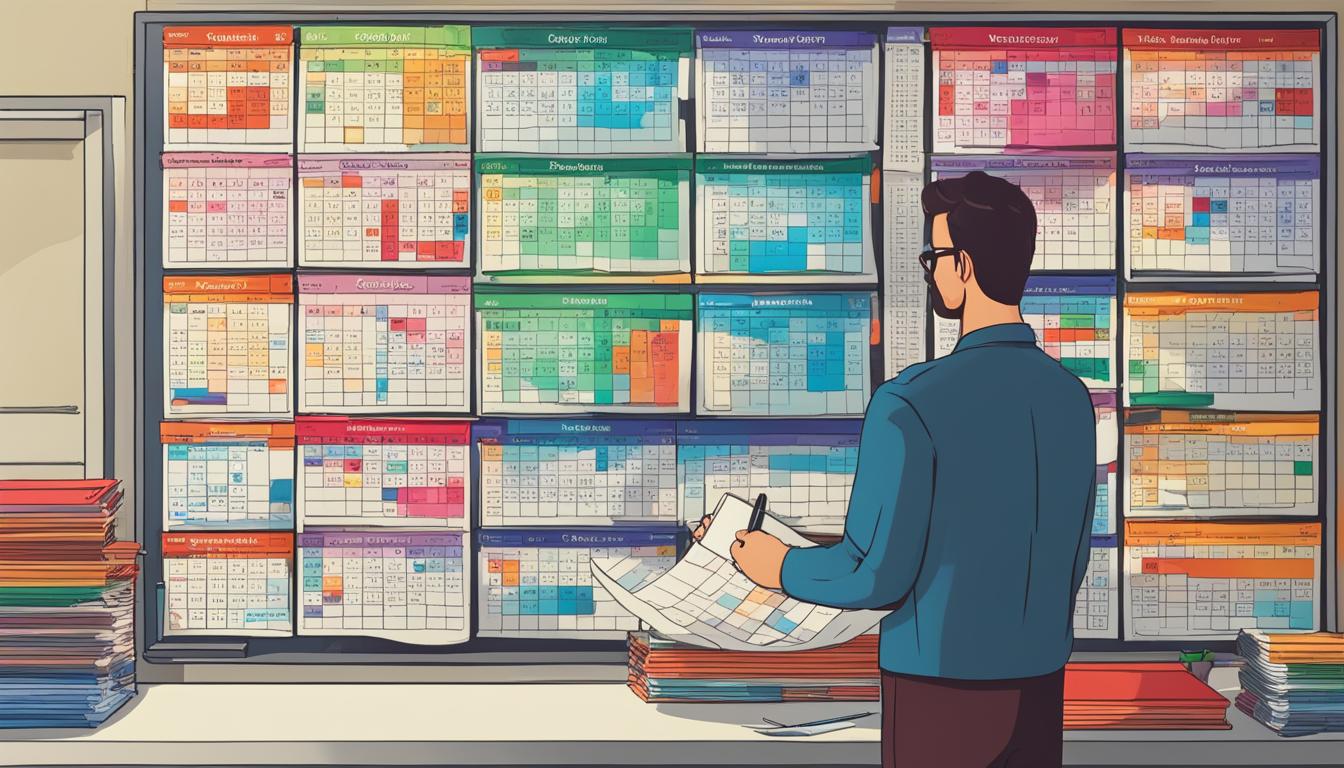Maintaining a high level of productivity is crucial for success in today’s fast-paced world. Whether you’re a busy professional or a multitasking parent, finding ways to enhance your personal productivity is essential for achieving your goals. In this article, we’ll explore a range of techniques to help you boost your productivity and make the most out of your days.
From effective time management and goal setting to task prioritization and efficient work habits, we’ll cover practical strategies that can help you optimize your productivity. We’ll also delve into tips for maintaining a healthy work-life balance, using productivity tools to your advantage, establishing daily routines, implementing time-blocking techniques, and staying focused throughout the day.
Are you ready to take your productivity to the next level? Let’s dive in!
Key Takeaways:
- Implementing effective time management techniques is crucial for boosting personal productivity.
- Setting clear goals and prioritizing tasks can help you stay focused and make progress toward your objectives.
- Creating a productive work environment and minimizing distractions are essential for maximizing efficiency.
- Embracing single-tasking, varying your work environment, and celebrating progress over perfection can contribute to increased productivity.
- Taking care of yourself, maintaining healthy habits, and balancing work and personal life are vital for long-term productivity.
Identify Your Biological Prime Time
Your energy levels and focus naturally have peaks and valleys driven by your ultradian rhythms. These rhythms are recurring patterns that occur throughout the day, affecting your cognitive abilities, concentration, and motivation.
To optimize your productivity, it’s crucial to identify your biological prime time – the periods when you are most alert, focused, and in the optimal state of flow. Keeping track of your energy patterns can help you align your tasks with your natural rhythms, boosting your performance and efficiency.
Understanding Ultradian Rhythms
Ultradian rhythms are biological cycles that repeat multiple times within a 24-hour period. Unlike circadian rhythms that have a 24-hour cycle, ultradian rhythms are shorter, lasting between 90 and 120 minutes.
“Ultradian rhythms govern our brain’s ability to sustain focus and concentration. By syncing our tasks with these natural cycles, we can harness the power of our biological prime time.”
During these ultradian cycles, your body transitions between high-energy phases and recovery phases. It’s during the high-energy phases when you experience heightened focus, motivation, and cognitive processing. By recognizing and leveraging these periods, you can optimize your productivity and achieve more meaningful outcomes.
Finding Your Biological Prime Time
Discovering your biological prime time requires self-awareness and observation. Keep a journal or use a productivity app to track your energy levels, focus, and motivation throughout the day. Take note of when you feel most alert, creative, and engaged in your work.
“Keeping a journal helps identify the times when you are most productive, allowing you to plan your day and allocate your tasks based on your biological prime time.”

The image above highlights the importance of aligning your tasks with your biological prime time, maximizing productivity during your periods of peak cognitive performance.
Optimizing Your Work Schedule
Once you have identified your golden hours, reserve them for tasks that require deep concentration, complex problem-solving, or creative thinking. These activities are best suited to your peak cognitive performance when you can make significant progress and achieve high-quality results.
On the other hand, when you are feeling less energetic or drained, it’s advisable to tackle less demanding tasks or activities that require less mental effort. This allows you to use your energy wisely and avoid burnout.
By strategically planning and scheduling your work based on your biological prime time, you can maximize your focus, motivation, and overall productivity.
Prioritize Your Tasks
Avoid setting yourself up for failure by prioritizing your tasks effectively. With the overwhelming number of tasks we face each day, it’s crucial to employ techniques that can help you focus on the most important ones. Task prioritization is essential for maximizing productivity and achieving your goals efficiently.
One technique that can guide your task prioritization is called The Magical Number Seven Plus or Minus Two. According to this principle, our working memory can only handle around seven items at a time. Therefore, it’s recommended to select between five and nine priority tasks for the day. This ensures that you have a manageable list that allows you to stay focused and productive.
Another effective technique is the 1-3-5 Rule. This rule involves selecting one big task, three medium tasks, and five small tasks to accomplish each day. By following this rule, you can strike a balance between tackling significant projects and completing smaller tasks, ensuring a sense of accomplishment at the end of the day.
Additionally, the Eisenhower Matrix can be a valuable tool for prioritizing tasks. This matrix divides tasks into four categories: urgent and important, important but not urgent, urgent but not important, and neither urgent nor important. By categorizing your tasks in this way, you can identify which ones require immediate attention and which can be delegated or eliminated.
Implementing these task prioritization techniques can significantly improve your productivity and allow you to focus on what truly matters. By selecting a manageable number of tasks, utilizing the 1-3-5 Rule, and leveraging the Eisenhower Matrix, you can ensure that you’re making progress on your most important goals and tasks.
Minimize Distractions
Distractions and interruptions can significantly impact productivity. In today’s digital age, it’s crucial to find ways to minimize distractions and stay focused. Let’s explore some strategies to reduce both self-imposed and environmentally imposed distractions.
Reduce Self-Imposed Distractions
Self-imposed distractions are often the result of constant notifications, incessant checking of social media, or getting lost in the never-ending scroll of online content. To combat these distractions:
Turn off notifications: Silence your phone or other devices during designated work periods. This simple action can help you stay focused and avoid constant interruptions.
Set up autoresponders: Use autoresponders for emails and other communication channels to manage expectations and let people know when you’ll be available to respond.
Use browser blockers: Install browser extensions that block access to social media websites or other distracting platforms during work hours.
Handle Environmentally Imposed Distractions
Environmentally imposed distractions are external factors that can disrupt your workflow, such as noise or interruptions from colleagues. Here’s how you can address them:
Wear headphones: Invest in a good pair of headphones or earbuds to block out noise and create a focused environment. Listening to instrumental music or ambient sounds can also help you concentrate on your tasks.

It’s important to keep in mind that distractions not only waste time but also require additional time and energy to refocus. By minimizing both self-imposed and environmentally imposed distractions, you can create a more productive work environment and boost your efficiency
Embrace Single-Tasking
While it may seem counterintuitive, multitasking can actually hinder productivity. Constantly switching between tasks can lead to decreased focus, increased stress, and a lower quality of work. Instead, it’s time to embrace the power of single-tasking.
When you focus on one task at a time, you can give it your full attention and maximize your efficiency. By eliminating the distractions that come with juggling multiple tasks, you can dive deep into the task at hand and produce higher-quality work.
One technique to enhance single-tasking is to use external self-talk. Verbalize your commitment to completing the task, reinforcing your focus and determination. This simple practice can help you stay on track and avoid drifting to other tasks.
To further optimize your productivity, consider batching similar tasks together. Grouping related activities allows you to build momentum and minimize the time wasted on task-switching. For example, dedicate a specific time window to responding to emails, another for brainstorming sessions, and another for focused work on a specific project.
Additionally, implementing time blocking can help you allocate dedicated time slots for different types of tasks. By scheduling specific periods for deep work, routine tasks, and breaks, you can create a structured workflow that reduces distractions and encourages productivity.

Embracing single-tasking can help you unlock a whole new level of productivity. By eliminating the urge to multitask and adopting a focused approach, you can accomplish more in less time. Remember, it’s about quality over quantity.
Create a Productive Environment
When it comes to boosting productivity, creating a well-organized and inspiring workspace plays a crucial role. A clutter-free and streamlined workspace can help clear your mind and improve focus. Consider implementing the following tips to optimize your workspace:
Workspace Organization
Keep your workspace clean and well-organized to minimize distractions and promote efficient work habits. Have designated spaces for different items and invest in storage solutions like filing cabinets or desk organizers. Maintaining order in your workspace can help you find what you need quickly and stay on top of your tasks.
Ergonomic Accessories
Invest in ergonomic accessories such as an adjustable chair, a keyboard tray, and a monitor stand to support your body while working. Proper ergonomics can prevent discomfort, muscle strain, and fatigue, allowing you to maintain productivity for longer periods without compromising your health.
Natural Light
Positioning your desk near a window can maximize the benefits of natural light. Natural light not only enhances your mood but also improves focus and alertness. Consider adjusting your workspace layout to take advantage of the natural light sources in your office or home.

Plants
Add a touch of green to your workspace by incorporating indoor plants. Plants not only beautify your environment but also have numerous benefits for productivity and well-being. They can improve air quality, reduce stress, and increase concentration. Choose low-maintenance plants that thrive indoors, such as snake plants or pothos, and place them strategically around your workspace.
Productivity Tools
Take advantage of technology to enhance your efficiency and organization. There are numerous productivity tools available, such as password managers, project management platforms, and note-taking apps. Find the tools that align with your workflow and integrate them into your daily routine to streamline tasks and improve productivity.
Vary Your Work Environment
Occasionally changing your work environment can provide a much-needed break and boost productivity. Staying in the same setting day in and day out can lead to stagnation and decreased motivation. By introducing a change of environment, you can stimulate novelty and inject a sense of freshness into your work routine.

When considering a change of environment, think beyond the confines of your office walls. A simple shift to a different location, such as a coffee shop or an outdoor space, can offer a new and inspiring atmosphere. The ambiance, background noise, and visual stimuli of a coffee shop can create a conducive environment for focused work. Alternatively, working outdoors can provide a breath of fresh air and a lively backdrop that invigorates your senses.
Research suggests that introducing novelty into your work routine can trigger the release of dopamine, a neurotransmitter associated with motivation and reward. This natural chemical response motivates you to explore and engage with your surroundings, leading to increased productivity and creativity.
Dopamine plays a crucial role in maintaining motivation levels, and by varying your work environment, you can enhance the release of this neurotransmitter, ultimately fueling your drive to accomplish tasks. So the next time you feel your motivation waning, consider changing your location to inject a sense of novelty and reignite your productivity.
Embrace Progress Over Perfection
Perfectionism can be a hindrance to productivity. Instead, shift your focus towards making progress. Remember, done is better than perfect. Allow yourself to let go of the constant need for every detail to be flawless and embrace the idea of continuous improvement.
One effective technique to prioritize progress is timeboxing. Set specific time limits for each task or project, ensuring that you allocate a reasonable amount of time for completion. Use this time to work diligently without getting caught up in the pursuit of perfection.
“Perfection is not attainable, but if we chase perfection, we can catch excellence.” – Vince Lombardi
Celebrate your accomplishments, even if they are not perfect. Recognize that progress is a positive step forward, and each completed task brings you closer to your goals. By shifting your mindset to focus on progress rather than perfection, you’ll find yourself making significant strides towards productivity and success.

Remember, the key to productivity is not striving for perfection but making consistent progress. Embrace this mindset, use timeboxing to your advantage, and celebrate the small victories along the way. It’s time to release the burden of perfectionism and start achieving your goals.
Take Care of Yourself
Your overall well-being influences productivity. It’s important to prioritize self-care and maintain healthy habits to ensure you have the energy and focus to perform at your best.
Healthy Habits
Make sure to hydrate throughout the day. Staying properly hydrated helps keep your body and mind functioning optimally. Take regular breaks to give yourself a mental and physical rest. Stretching can also help alleviate tension and improve blood circulation.
Boost Productivity with Fresh Air
“Fresh air is like a reset button for the brain.”
Studies show that exposure to nature can have a positive impact on productivity. Whenever possible, take short walks outside during your breaks to soak up some fresh air. It can help clear your mind and improve focus when you return to work.
Proper Sleep for Optimal Performance
Getting enough sleep is essential for maintaining productivity. Aim for 7-9 hours of quality sleep each night to recharge your body and mind. Adequate sleep helps improve concentration, memory, and overall cognitive function.
Incorporating these healthy habits into your daily routine can have a significant impact on your productivity levels. Remember, taking care of yourself is not only beneficial for your well-being but also vital for achieving more efficient and balanced days.

Conclusion
Boosting productivity is crucial for achieving personal success and maintaining efficient work habits. By implementing a combination of effective strategies, individuals can enhance their productivity and create a more balanced and fulfilling daily routine.
Identifying your biological prime time, the period when you are most energized and focused, allows you to allocate your most demanding tasks during these peak hours. Prioritizing tasks using techniques like the Magical Number Seven Plus or Minus Two principle and the Eisenhower Matrix helps you stay organized and focused on what truly matters.
Minimizing distractions, both self-imposed and environmentally imposed, is essential in creating an environment conducive to productivity. Embracing single-tasking, creating a productive workspace, and occasionally changing your work environment can also boost your focus and motivation.
Moreover, embracing progress over perfection and taking care of yourself through healthy habits, breaks, and proper sleep will contribute to your overall well-being and enhance your personal productivity. By implementing these strategies, you can develop efficient work habits that will enable you to achieve your goals and find a healthy work-life balance.
FAQ
How can I identify my most productive time of day?
Keep a journal to track your energy levels throughout the day and identify your biological prime time. This is the period when you feel most focused and in the zone. Plan your deep, complex, or creative work for this time.
How do I prioritize my tasks effectively?
Use techniques like the Magical Number Seven Plus or Minus Two principle and the 1-3-5 rule to narrow down your to-do list. The Eisenhower Matrix can help you determine which tasks are most important and which can be delegated or eliminated.
How can I minimize distractions and interruptions?
Minimize self-imposed distractions by turning off notifications, setting up autoresponders, and using browser blockers. Use headphones to block out environmental noise. Remember that distractions not only waste time but also require extra time and energy to refocus.
Is multitasking beneficial for productivity?
No, multitasking can actually hinder productivity. Instead, embrace single-tasking by focusing on one task at a time. Use external self-talk to commit to the task at hand. Consider grouping similar tasks together and use time blocking to allocate specific time windows for different types of tasks.
How can I create a productive workspace?
Streamline and declutter your workspace for clearer thinking. Add pops of color or live plants to improve mood and focus. Position your desk near a window to maximize natural light. Utilize productivity tools like password managers and project management platforms.
Should I change my work environment occasionally?
Yes, occasionally changing your work environment can provide a break and boost productivity. Consider working in different locations, such as a coffee shop or outdoor space, to stimulate novelty. Your brain craves new experiences, releasing dopamine which enhances motivation.
How can I overcome perfectionism and focus on progress?
Set time limits for tasks and projects to prevent constant tweaking. Use timeboxing to allocate a specific time period to work on a task, accepting that it may not be perfect, but it is done for now. Celebrate accomplishments and move on to the next task.
How important is self-care for productivity?
Self-care is essential for productivity. Maintain healthy habits like hydrating, taking regular breaks, stretching, and getting enough sleep. Regular breaks and exposure to nature can actually boost productivity. Prioritize self-care to have the energy and focus to perform at your best.
What are some strategies for boosting personal productivity?
Boosting productivity requires a combination of strategies, including identifying your prime time, prioritizing tasks, minimizing distractions, creating a productive environment, embracing progress over perfection, and taking care of yourself. By implementing these techniques, you can enhance your personal productivity and achieve more efficient and balanced daily routines.


